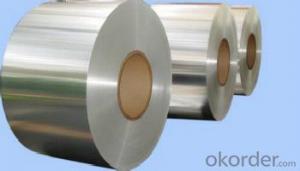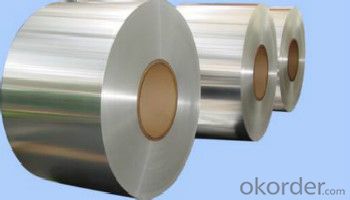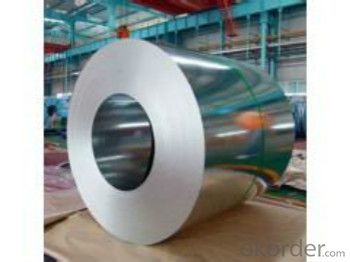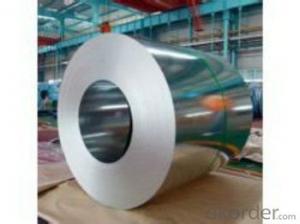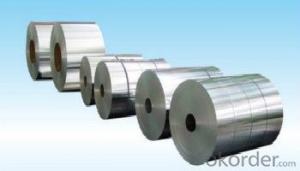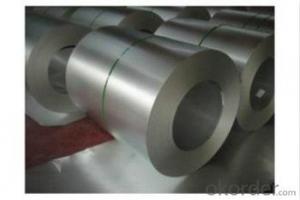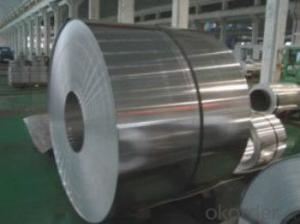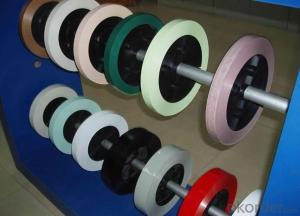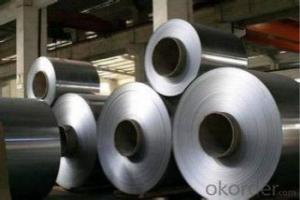Mill Finished Aluminum Coil AA3105 Temper H24 - Coil of Aluminum 6 Wide
- Loading Port:
- Shanghai
- Payment Terms:
- TT or LC
- Min Order Qty:
- 3 m.t.
- Supply Capability:
- 4000 m.t./month
OKorder Service Pledge
OKorder Financial Service
You Might Also Like
Specification
1. Aluminum Coil Description:
Aluminum coil, is a rolled product, produced in a coiled form of continuous strip, and having an ID (Inner diameter) and OD (Outer diameter).Common alloy coil are used for a wide variety of applications, alloy 1050, 1060, 3003, 3105, 3005, 5052, 5754, 5083, 6061, 8011, 8021, and so on, in thickness from 0.0065-7mm, in width from 300- 2200mm.
Aluminium coil can be deep processed into aluminium foilstock, aluminium circle, aluminium coating products, aluminium ceiling, aluminium plastic composite panel (APCP), aluminium embossed products, etc.
2.Main Features of the Aluminum Coil:
• Great ductility
• Heat conductivity
• Anti-corrosion
• Moisture resistanve
3.Aluminum Coil Images
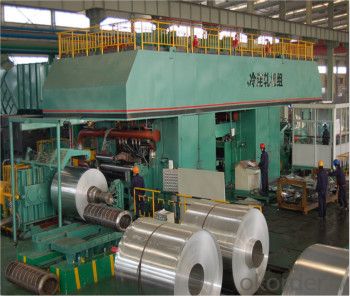
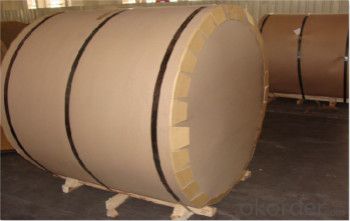
4.Aluminum Coil Specification
Aluminum Coil/Sheet | |
Main Specification | |
Alloy | AA1xxx (AA1050, AA1060, AA1070, AA1100 etc.) |
AA3xxx (AA3003, AA3004, AA3005, AA3105 etc.) | |
AA5xxx, AA6XXX (AA5052,AA5083, AA5754, AA6061, AA6062 etc.) | |
AA8xxx(AA8011, AA8006, AA8079 etc.) | |
Temper | H14,H16, H18, H22, H24, H26, H32,O/F |
Thickmess | ≥0.2mm |
Width | 30mm-2100mm |
Standard | GB/T 3880-2006 |
Special specification is available on customer's requirement | |
5.FAQ
We have organized several common questions for our clients,may help you sincerely:
(1) How to guarantee the quality of the products?
We have established the international advanced quality management system, every link from raw material to final product. we have strict quality test; we resolutely put an end to unqualified products flowing into the market. At the same time, we will provide necessary follow-up service assurance.
(2) MOQ?
For trail order, we accept 3 MT.
(3) Payment term?
30% deposit, balance against the BL copy; 100% L/C at sight
(4) What is the delivery time?
Depends on actual order, around 30 to 35 days
- Q: what language did Aluminum and Uranium originate from ? Who or what were they named for ?
- The ancient Greeks and Romans used alumen (alum, potassium aluminium sulfate, K2Al6(OH)12(SO4)4) in medicine as an astringent, and as a mordant in dyeing. Alum was exported from ancient Greece and Italy. In 1761 the French chemist Louis-Bernard Guyton de Morveau (1737-1816) proposed the name alumine for the base in alum. Guyton de Morveau was instrumental in setting up a standardised system for chemical nomenclature and often collaborated with Antoine Lavoisier, who in 1787, suggested that alumine was the oxide of a previously undiscovered metal. In 1808, Sir Humphry Davy (1778-1829) did experiments for the decomposition of alumine, silex, zircone, and glucine. He failed to isolate the metals in these, as he reported in his paper for the Royal Society of London on 30 June 1808, but he suggested names for the metals (note) Cf. Silicium, Zirconium, and Beryllium (Glucium) Thus he proposed the name alumium for this still undiscovered metal and later agreed to change it to aluminum. Shortly thereafter the name aluminium was adopted to conform with the -ium ending of most elements. Uranium was named by its discoverer German chemist Martin Klaproth, after the last planet to have been discovered Uranus.
- Q: Who knows the color coated aluminum roll, that is, roll coating manufacturers? Yes, let me know!
- Color coated aluminum coil roller coating and spraying, Ji'nan Xinhai professional production of aluminum and coated aluminum coil, the color red is the most expensive in any choice.
- Q: What are the different mechanical properties of aluminum coils?
- Aluminum coils possess various mechanical properties that make them highly desirable for a wide range of applications. Some of the key mechanical properties of aluminum coils include: 1. Strength: Aluminum coils exhibit impressive strength, making them suitable for structural applications. The strength of aluminum can be further enhanced through alloying or heat treatment processes. 2. Ductility: Aluminum coils are highly ductile, allowing for easy forming and shaping. This property enables the production of complex shapes and intricate designs without compromising the material's integrity. 3. Lightweight: Aluminum is renowned for its low density, making it one of the lightest metals available. This property makes aluminum coils ideal for applications where weight reduction is crucial, such as in aerospace and automotive industries. 4. Corrosion resistance: Aluminum has natural corrosion resistance, forming a protective oxide layer that prevents further oxidation. This property makes aluminum coils suitable for outdoor and marine environments, as they can withstand harsh conditions and reduce maintenance requirements. 5. Conductivity: Aluminum is an excellent conductor of both heat and electricity. This property makes aluminum coils ideal for applications that require efficient heat transfer, such as in heat exchangers and electrical wiring. 6. Machinability: Aluminum coils are relatively easy to machine due to their low melting point and excellent chip formation. This property allows for high-speed machining operations, resulting in reduced production time and costs. 7. Weldability: Aluminum coils can be easily welded using various techniques, such as TIG (Tungsten Inert Gas) or MIG (Metal Inert Gas) welding. This property enables the fabrication of complex structures and the joining of aluminum components. 8. Fatigue resistance: Aluminum exhibits excellent fatigue resistance, allowing it to withstand repeated stress cycles without failure. This property makes aluminum coils suitable for applications subjected to cyclic loading, such as in automotive components or structures exposed to wind or waves. Overall, the unique combination of mechanical properties possessed by aluminum coils, including strength, ductility, lightweight, corrosion resistance, conductivity, machinability, weldability, and fatigue resistance, makes them a versatile material choice for a wide range of industries and applications.
- Q: Is it possible to utilize aluminum coil in the welding process?
- <p>Yes, aluminum coil can be used for welding. It is commonly used as a filler material in processes like MIG (Metal Inert Gas) welding, where it is fed continuously into the weld pool to create a joint. Aluminum welding requires specific techniques and equipment due to its high thermal conductivity and the need to prevent oxidation. The aluminum coil must be of high quality and clean to ensure a strong, corrosion-resistant weld.</p>
- Q: What are the common surface protection methods for aluminum coils?
- Various industries widely use several common methods for protecting the surface of aluminum coils. These methods aim to ensure the long-term durability and performance of the coils by preventing corrosion and other types of damage. Anodizing is one of the most common surface protection methods for aluminum coils. It involves immersing the coil in an electrolyte bath and applying an electric current to create a protective oxide layer on the surface. This oxide layer not only improves the appearance of the coil but also enhances its resistance to corrosion, scratching, and wear. Coating is another popular method for protecting the surface of aluminum coils. It involves applying a layer of paint or coating material onto the coil's surface. Coatings can be applied using various techniques, such as electrostatic spraying, roll coating, or coil coating. These coatings act as a barrier between the aluminum surface and external elements, safeguarding it from moisture, UV radiation, and other environmental factors that can cause corrosion and damage. Protective films also offer a way to protect aluminum coils. These films, typically made from polyethylene or similar materials, are applied as a temporary protective layer. They help prevent scratches, abrasions, and other types of damage during transportation, storage, and installation. When it's time to use the aluminum coil, the protective film can be easily peeled off, leaving behind a clean and undamaged surface. Proper storage and handling practices are also crucial for protecting aluminum coils. Storing the coils in a dry, clean, and well-ventilated area, away from corrosive substances, can significantly extend their lifespan. Additionally, handling the coils with care and using appropriate lifting and transportation equipment can prevent physical damage that could compromise their integrity. In conclusion, the common methods for protecting the surface of aluminum coils include anodizing, coating, the use of protective films, as well as proper storage and handling practices. By employing these methods, aluminum coils can be effectively safeguarded against corrosion, scratching, and other forms of damage, ensuring optimal performance and longevity.
- Q: What are the typical lead times for ordering aluminum coils?
- The typical lead times for ordering aluminum coils can vary depending on various factors such as the supplier, quantity, customization requirements, and current market conditions. However, on average, lead times can range from a few weeks to a couple of months. It is advisable to contact the specific supplier for accurate information regarding their lead times.
- Q: I live in blue ridge ga and have about 2,000 aluminum cans and would like to know how much I can get for them.
- The price for scrap aluminum cans varies litteraly every day. Within the last year, it has been between about 28 cents and 50 cents a pound. The last price I saw for clean, flattened cans delivered to the dealer was about 42 cents. As I said, it could be a bit higher or lower than that now. There are about 30-32 cans per pound of aluminum, so your 2,000 cans probably weigh around 64 pounds and could be worth about $27, assuming there has been no big change in the price recently. But that's a delivered price. If you have to drive 10 miles each way and your truck gets 20 mpg, you will be paying for a gallon of gas. If it is 30 miles each way (60 miles total), you are looking at 3 gallons of gas, which is probably about $8, leaving you a profit of around $19, or maybe a little less. That's with some optimistic assumptions, and it doesn't include the cost of big plastic bags to carry the cans. Not very encouraging, is it? Recycling makes sense for a big city or a recycling center, where they can get thousands of cans a day. But it is hard for an individual to make any money at it. i know this is not what you wanted to hear, but I hope it is helpful anyway.
- Q: Is it possible to use a grinder for cutting aluminum coil?
- <p>Yes, you can use a grinder to cut aluminum coil, but it's essential to choose the right type of grinder and blade. A metal cutting grinder with a suitable blade designed for cutting aluminum is recommended. Ensure the blade is sharp and the grinder is powerful enough to handle the material. Always wear appropriate safety gear, including gloves and eye protection, as cutting aluminum can produce sharp edges and flying debris. Be cautious of the heat generated during cutting, as it can warp or damage the aluminum.</p>
- Q: What are the different surface protection methods for aluminum coils?
- There are several surface protection methods available for aluminum coils to prevent corrosion and maintain their aesthetics. 1. Anodizing: Anodizing is a widely used method that creates a protective oxide layer on the surface of the aluminum coil. This process involves immersing the coil in an electrolytic solution and passing an electric current through it. Anodized aluminum coils have enhanced resistance to corrosion, abrasion, and weathering. 2. Coating: Aluminum coils can be coated with various protective coatings to enhance their durability and resistance to environmental factors. These coatings can be organic or inorganic, such as polyester, polyvinylidene fluoride (PVDF), epoxy, acrylic, or polyurethane. Coated aluminum coils provide excellent protection against UV radiation, chemicals, and abrasion. 3. Cladding: Cladding involves applying a layer of a different metal, such as stainless steel or zinc, onto the surface of the aluminum coil. This provides added protection against corrosion and improves the overall strength and appearance of the coil. 4. Laminating: Laminating involves bonding a protective film onto the surface of the aluminum coil. This film can be made of various materials, such as PVC or PET, and serves as a barrier against scratches, stains, and UV radiation. 5. Chemical conversion coating: Chemical conversion coatings, such as chromate or phosphate coatings, can be applied to aluminum coils to enhance their corrosion resistance. These coatings chemically react with the aluminum surface, forming a protective layer that inhibits corrosion. 6. Waxing: Applying a layer of wax onto the surface of aluminum coils is a simple and cost-effective method to protect against corrosion and maintain the coil's appearance. The wax provides a barrier against moisture, chemicals, and contaminants. It is important to choose the most suitable surface protection method based on the specific requirements and intended use of the aluminum coils. Factors such as the desired level of corrosion resistance, aesthetics, durability, and environmental conditions should be considered when selecting the appropriate method.
- Q: Are aluminum coils suitable for electrical transformers?
- Electrical transformers can indeed utilize aluminum coils. Aluminum, being a lightweight and cost-effective material, presents numerous advantages when it comes to transformer construction. Its electrical conductivity is outstanding, comparable to that of copper, which ensures efficient power transfer. Moreover, aluminum coils exhibit lower resistance than their copper counterparts, thereby reducing power losses and enhancing energy efficiency. The utilization of aluminum coils also aids in weight reduction, resulting in easier handling and transportation. Nonetheless, due to their marginally lower conductivity, aluminum coils necessitate larger cross-sections compared to copper coils. Consequently, transformers employing aluminum coils may exhibit a slightly larger size. Nevertheless, overall, aluminum coils serve as a viable and extensively employed substitute for copper coils in electrical transformers, offering cost savings, high conductivity, and improved energy efficiency.
Send your message to us
Mill Finished Aluminum Coil AA3105 Temper H24 - Coil of Aluminum 6 Wide
- Loading Port:
- Shanghai
- Payment Terms:
- TT or LC
- Min Order Qty:
- 3 m.t.
- Supply Capability:
- 4000 m.t./month
OKorder Service Pledge
OKorder Financial Service
Similar products
Hot products
Hot Searches
Related keywords
